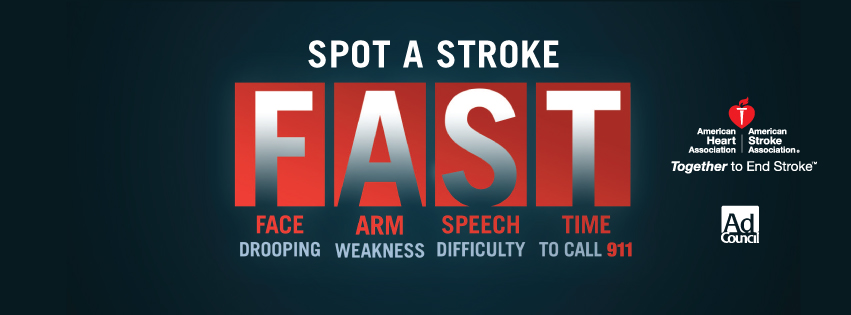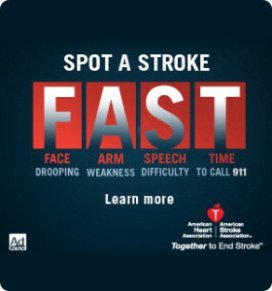On the 29th of October, we acknowledge a very important health issue, during World Stroke Day. Strokes are the third cause of disability worldwide and, this year, the American Stroke Association wants to educate as many people as possible about the FAST warning signs.

What is a stroke?
A stroke is an event happening when a blood vessel in the brain is blocked or bursts. Therefore, the brain cells that are supposed to be nourished by that vessel are deprived of oxygen and nutrients and eventually die.
What types of strokes can occur?
On the one hand, strokes can be caused by obstruction, usually because of clots, called “ischemic strokes”. On the other hand, strokes can be caused by a rupture of a blood vessel causing a hemorrhagic stroke.
There are also “mini strokes” called TIA (transient ischemic attack) caused by a temporary clot. These are reversible and don’t cause disability but they are also signs of future ischemic strokes.
What happens when a stroke occurs?
The brain is an extremely complex organ that controls various body functions. If a stroke occurs and blood flow can’t reach the region that controls a particular body function, that part of the body won’t work as it should. This might result in impaired movements going up to palsy, impaired speech, patients might not be able to understand speech or complete complex thought processes.
What can we do?
Up to 80% of clot-related strokes maybe preventable. The most important part of this lays on the patient at risk. The American Stroke Association propose an 8 step checklist for preventing second clot-related strokes.
- Monitor your blood pressure
- Control your cholesterol
- Keep your blood sugar down
- Get active
- Eat better
- Lose weight if you need to
- Don’t smoke
- Talk with your doctor about aspirin and other medication
Also, if you witness someone having a stroke, acting FAST is of essence. FAST is an acronym meant to easily remember how to recognize a stroke, in order to contact medical care as quickly as possible. Here’s what it stands for:
F – FACIAL DROOPING If you ask a person to smile and you see a croaked smile, it might be a sign of muscle weakness, consistent of a stroke.
A – ARM WEAKNESS Ask them to raise their arms and if one of them is drifting downward it is also a sign of a stroke.
S – SPEECH DIFFICULTY Ask a person to repeat a simple word or sentence such as “ball” or “The sky is blue”. If the speech is slurred or the person is unable to speak or is hard to understand, this is a sign of a stroke.
T – TIME TO CALL AN AMBULANCE If someone shows any of these symptoms, even if the symptoms go away, call emergency and say, “I think this is a stroke” to help get the person to the hospital immediately. Time is important! Don’t delay, and also note the time when the first symptoms appeared. Emergency responders will want to know. If you are unsure, call anyway, you might help saving a life.
Much love,
Cristina


Be the first to comment on "If Stroke Act FAST"